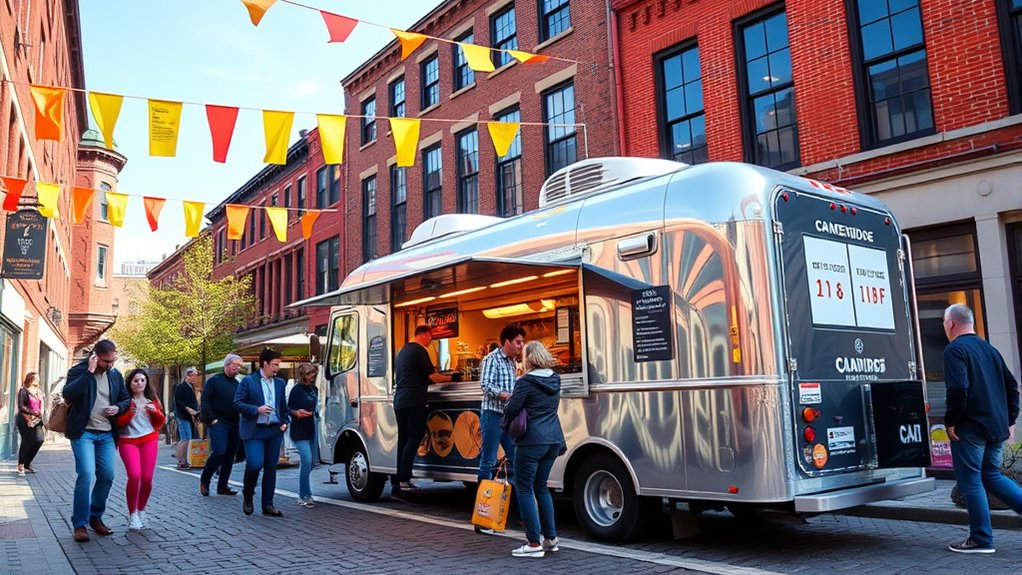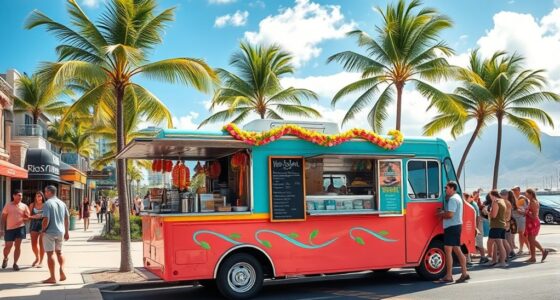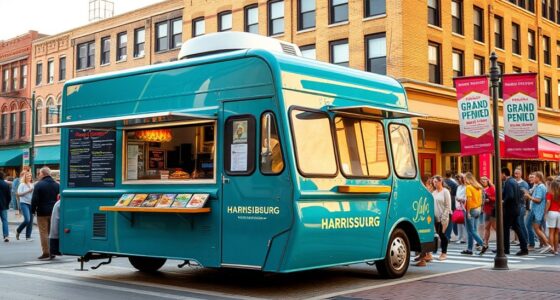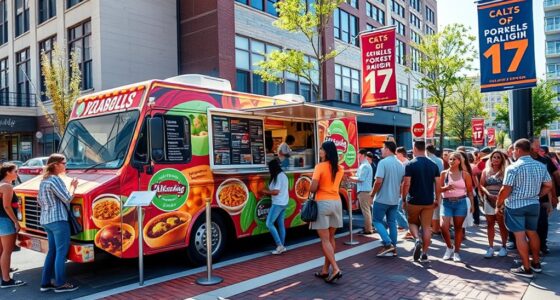To open a food truck in Cambridge, you’ll need permits from the Cambridge License Commission, health inspections, and possibly property permissions. Expect startup costs between $50,000 and $250,000, with ongoing expenses for permits, supplies, and staff. Finding prime locations involves securing site approval and complying with regulations, while ensuring food safety standards is vital. If you want to learn how to navigate permits, costs, locations, and marketing strategies effectively, keep exploring this guide.
Key Takeaways
- Obtain necessary permits from Cambridge License Commission, Traffic, and Community Development, including health, fire, and location-specific approvals.
- Budget initial costs between $50,000–$250,000 and monthly expenses of $5,000–$10,000, covering permits, equipment, and operations.
- Secure property permission and ensure compliance with location restrictions, avoiding proximity to residential areas and brick-and-mortar businesses.
- Develop a health-conscious menu with seasonal ingredients, and implement marketing strategies emphasizing wellness and local sourcing.
- Pass health and safety inspections, including staff certification, proper truck layout, sanitation, and maintaining documentation for permits and commissary.
Navigating Permits and Licensing in Cambridge
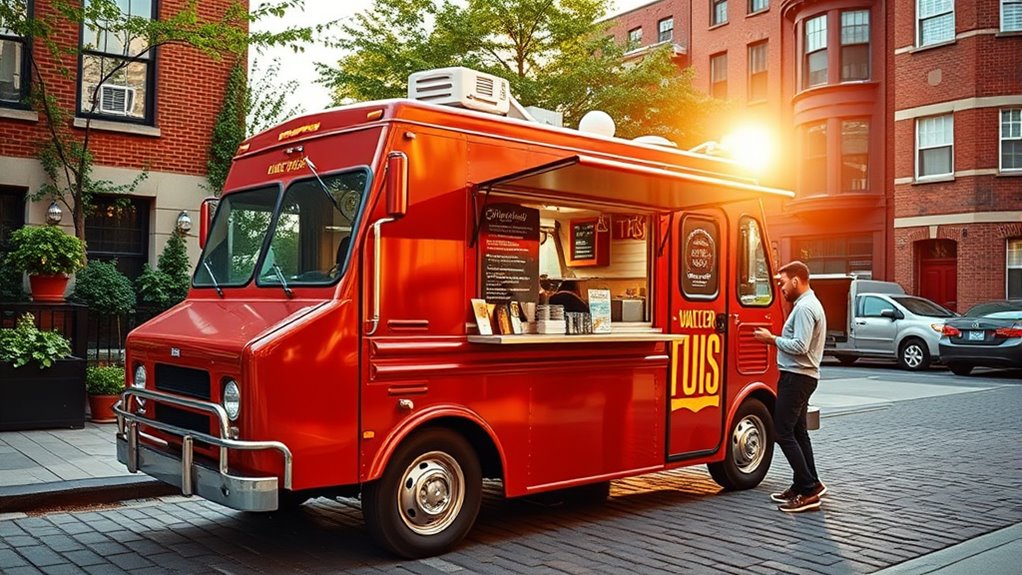
Managing permits and licensing in Cambridge requires understanding the specific steps you must follow to operate legally. First, you need a Mobile Food Truck License from the Cambridge License Commission, which involves applying online through the City’s permitting system. If you plan to vend on private property, get a letter of permission from the property owner with details like date, time, and contact info. Vendors outside Massachusetts must obtain a Massachusetts State Hawker/Peddler License from the Division of Standards. Before receiving your permit, your truck must pass health and sanitation inspections and submit a Peddler Truck Inspection Form. You’ll also need a Business Certificate, a Commissary Kitchen Agreement, and at least one valid Hawker/Peddler License. Keep in mind, permits are usually valid only on private property unless additional approvals are obtained for public sites.
Understanding Costs and Fees for Food Truck Operations
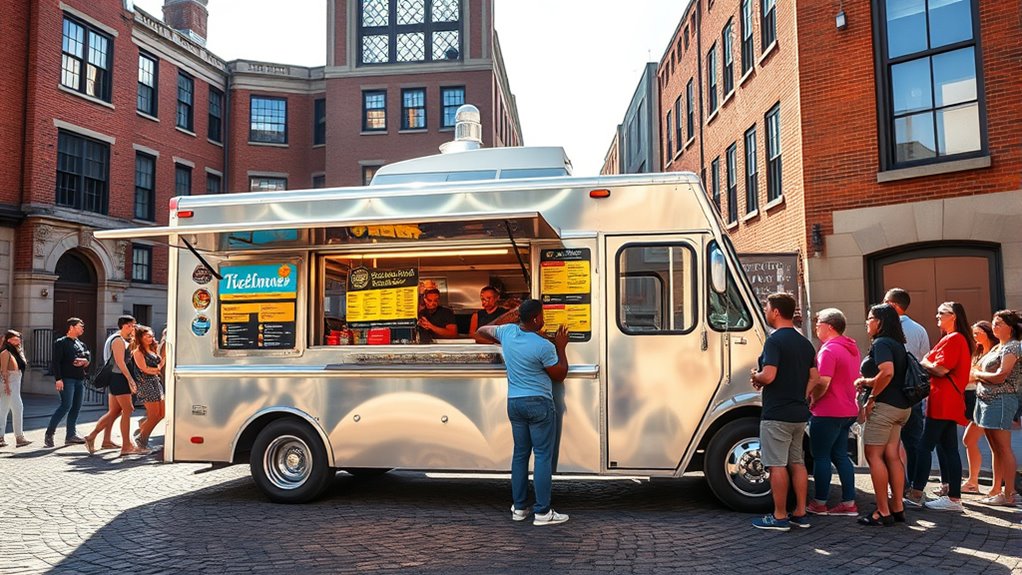
Understanding the costs and fees associated with operating a food truck in Cambridge helps you plan a realistic budget and guarantee profitability. Monthly expenses typically range from $5,000 to $10,000, with fuel, labor, and supplies making up the bulk of costs. Keeping these expenses under 65–70% of your revenue is key to healthy profit margins. Food and supplies usually cost $1,000 to $3,000 monthly, depending on menu complexity and sourcing. Fuel expenses can be $500 to $1,000 each month, while maintenance adds another $500 to $1,000. Labor costs for 2–4 staff are typically $6,000 to $12,000 monthly. Additionally, permits, licenses, commissary rentals, waste disposal, and insurance contribute to fixed and variable fees, so budgeting carefully guarantees smooth operations and financial stability. Food truck industry is experiencing a 60% YoY sales increase, driven by platformization and AI adoption, which can further impact operational costs and revenue potential. Understanding the local regulatory environment is essential to ensure compliance and avoid unexpected expenses as regulations evolve.
Choosing and Securing Optimal Vending Locations

To select the best vending spots, you need to understand property authorization requirements and secure the necessary permits. Be aware of location restrictions and regulations, especially near residential or brick-and-mortar businesses, to avoid conflicts. Considering event and temporary sites can also boost sales, but make sure you have proper approval before setting up. Additionally, familiarize yourself with cookie usage policies to ensure compliance with privacy regulations when operating your food truck.
Property Authorization Requirements
Securing the right vending location is essential for your food truck’s success in Cambridge, and that starts with obtaining proper property authorization. You need explicit permission from the property owner or their authorized representative before vending on private property. This permission must include specific details like dates, times, contact info, and reference your truck’s name. Written agreements or letters of permission serve as legal proof and are required for permit approval. A signed lease or special site agreement clarifies the location and usage conditions, often accompanied by a site photo and scaled drawing for city review. Failing to secure proper authorization can lead to permit denial or forced closure, so always guarantee you have the property owner’s consent before setting up your truck. Ensuring the property’s suitability can also involve understanding self watering plant pots, which exemplify the importance of proper setup and ongoing maintenance.
Location Permits and Restrictions
Choosing the right vending locations in Cambridge requires more than just finding a busy spot; it involves obtaining the necessary permits and understanding city restrictions. To operate legally, you must:
- Secure a Hawkers & Peddlers License and a Mobile Food Truck Permit.
- Obtain a Special Permit from the Traffic, Parking + Transportation Department for designated sites.
- Get a letter of permission from private property owners if vending on private property.
- Be aware that expiration dates and proper storage are essential to ensure the safety and compliance of your food offerings.
Public space vending is limited and strictly controlled. You’ll need approval from the Community Development Department, which may include notifying nearby residents and businesses. Inspections by health and fire departments ensure safety, and proof of liability insurance covering approved locations is mandatory for legal operation.
Event and Temporary Sites
Selecting the best vending locations in Cambridge involves understanding how to secure event and temporary sites that align with your business goals. Food trucks often operate seasonally from April through October, with specific days and times tailored to each site. Regular weekly schedules, like Tuesday to Thursday lunchtimes at Kendall/MIT Open Space, help build a steady customer base. Nighttime vending at Central Square and City Hall on Thursday through Saturday also boosts sales. Many locations in Cambridge don’t require individual permits, especially in programmed areas, but coordination with city departments or event organizers is essential. Securing sites may involve advance notice, especially for private events, and adhering to community guidelines. These sites offer opportunities for increased revenue, especially through catering and exclusive event setups. Understanding local regulations and community preferences is crucial for successful site selection and operation. Additionally, assessing projector technology compatibility with site conditions can enhance your service setup and customer experience.
Ensuring Food Safety and Health Compliance Standards
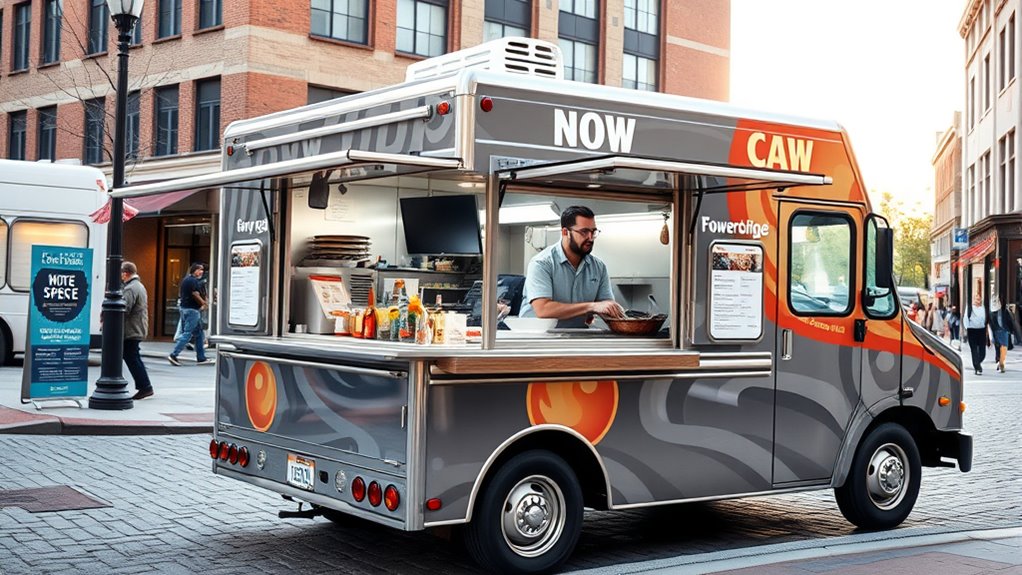
To keep your food truck compliant, you need to understand and follow health safety regulations and inspection requirements. Passing inspections and maintaining proper documentation are essential to operate legally in Cambridge. Staying on top of these standards helps protect your customers and keeps your business running smoothly. Regularly reviewing sound design techniques can also help ensure your promotional materials are engaging and professionally produced.
Food Safety Regulations
How do food trucks guarantee they meet strict safety standards and protect public health? They follow essential food safety regulations meticulously. First, maintaining proper food temperatures is critical; hot foods stay above 140°F, and cold foods stay below 41°F. Use calibrated thermometers to monitor temperatures during storage and service. Second, prevent cross-contamination by separating raw and cooked foods in storage and prep areas. Third, ensure all handlers wash hands frequently at accessible stations with hot and cold water. Additionally, one certified Food Protection Manager must oversee daily operations, bringing expertise in hazard control. Proper sourcing from approved suppliers, sanitation of equipment, and waste management further safeguard public health and ensure compliance with local regulations.
Inspection and Compliance
Ensuring your food truck meets all safety standards requires passing a thorough health inspection. You’ll need to schedule an appointment at 1010 Massachusetts Avenue, Monday through Friday mornings. Be prepared to present documents like your Health Permit Application, sample menu, proof of commissary kitchen use, and a Certified Food Protection Manager (CFPM) certification. Inspectors will evaluate your truck’s layout, food handling practices, equipment, and potential hazards for foodborne illnesses or fire risks. To obtain the permit, inspectors sign your Food Truck Permit Application after a successful review. Remember, at least one staff member must hold a CFPM certification, which involves completing training and passing an ANSI-standard exam. Also, you must provide proof of a compliant commissary kitchen and property permission for parking and operations. Food safety training and certification are essential requirements for mobile food vendors to ensure compliance with local health regulations. Incorporating effective wall organization strategies can help maintain a clean and hazard-free workspace within your truck, promoting safety and efficiency.
Budgeting for Startup and Ongoing Expenses
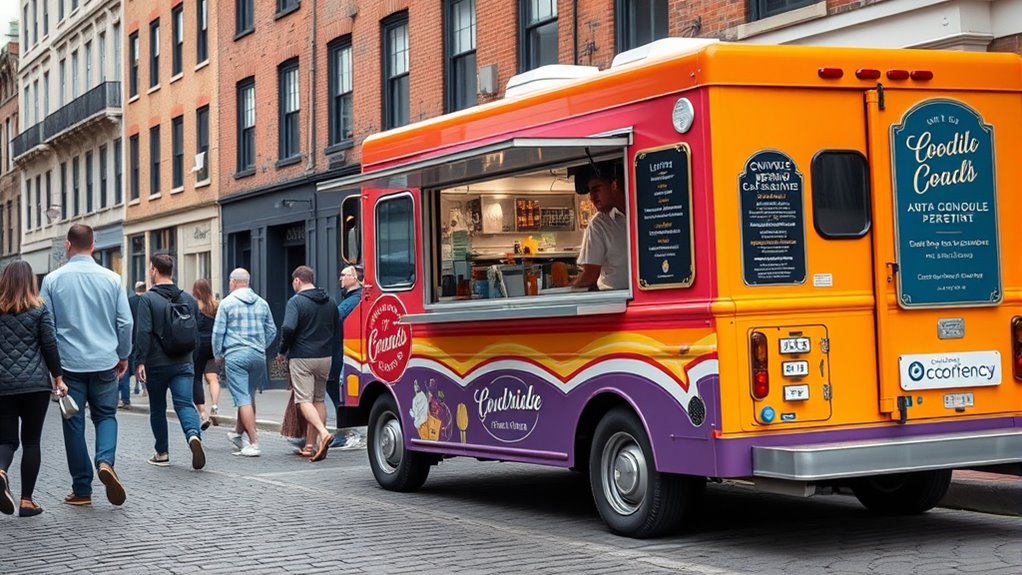
Budgeting for your food truck startup and ongoing expenses requires careful planning to cover all necessary costs without surprises. First, consider your initial investment, which can range from $50,000 to $250,000. This includes vehicle costs, equipment, permits, and inventory. Second, account for monthly expenses such as:
- Commissary rental ($500–$1,500)
- Insurance, fuel, and maintenance ($500–$1,000 annually)
- Location fees and supplies
Third, plan for permit and licensing fees, which can total over $17,000 in Cambridge, including business, health, and local permits. Also, expect ongoing costs for permits, permit renewal, supplies, and fuel. Proper budgeting guarantees your food truck runs smoothly without unexpected financial hurdles, and implementing organized budgeting practices can help track expenses effectively.
Effective Strategies for Marketing and Menu Development
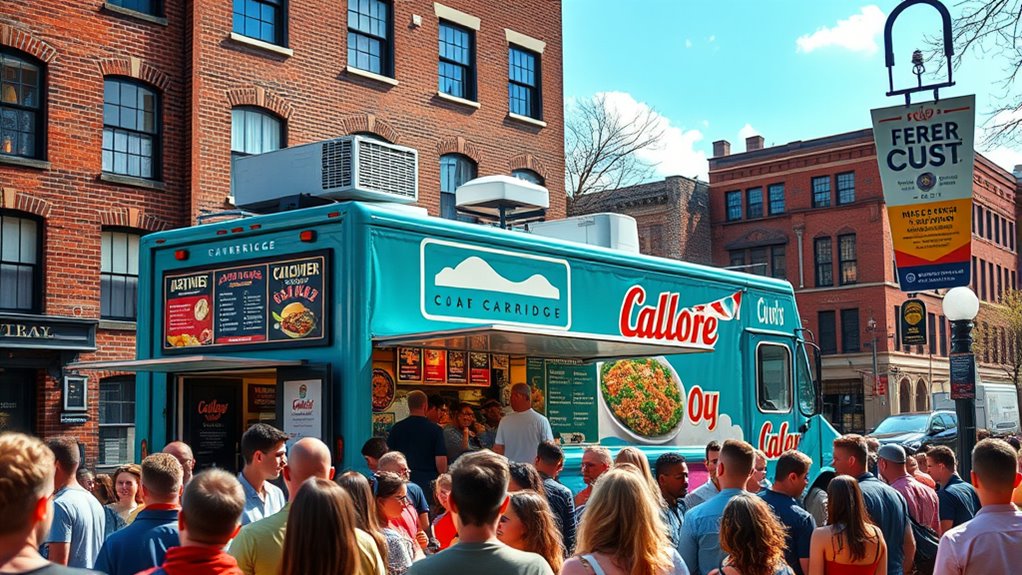
Developing an effective marketing and menu strategy is essential for attracting and retaining customers in Cambridge’s competitive food truck scene. Focus on health-conscious options like vegan, vegetarian, and wholesome meals to meet growing demand. Incorporate trending items such as “better burgers” and customizable dishes for profitability. Balance creativity with operational simplicity to fit your truck’s space and prep limits. Use seasonal, locally sourced ingredients to appeal to sustainability-minded customers. Create a core menu with signature items for efficiency and limited rotation to encourage repeat visits. Integrate popular Pimple Patches into your health-conscious offerings to appeal to wellness-focused customers.
Frequently Asked Questions
How Long Does the Permit Approval Process Typically Take in Cambridge?
You’re probably wondering how long the permit approval takes in Cambridge. Typically, it takes several weeks because inspections need scheduling and approvals from health and fire departments. Delays happen if inspection slots are booked or paperwork isn’t complete. To speed things up, you should prepare all documents early and schedule inspections promptly. Keep in mind, patience is key since multiple departments coordinate to finalize your permit.
Are There Specific Restrictions on the Types of Foods Allowed in Cambridge Food Trucks?
You should know that Cambridge has strict restrictions on food types in trucks. Deep-fat frying isn’t allowed unless fully contained, and open flame barbecuing is limited. All menu items must be approved by authorities, and food preparation methods need to conform to safety rules. You also need proper equipment, certification, and adherence to disposal and safety regulations. These restrictions ensure food safety and compliance, so plan your menu accordingly.
Can I Operate My Food Truck in Cambridge Without a Fixed Location?
Imagine your food truck as a vibrant stall in a bustling marketplace — now, picture that marketplace as Cambridge. You can’t just roam freely; you need a fixed spot. Without a designated location, you’re like a boat without a harbor. To operate legally, you must secure a permit for a specific private site. Vending on public streets or roaming isn’t allowed, so plan to settle in one approved location.
What Are the Penalties for Operating Without Proper Permits in Cambridge?
If you operate your food truck without proper permits in Cambridge, you risk serious penalties. Authorities can immediately shut down your truck, issue fines up to $250 or more, and revoke your vending privileges. You’ll also face stop work orders and be ineligible for future city programs. Operating illegally damages your reputation, making it harder to get necessary licenses, insurance, or access to prime vending locations in the future.
Is There a Recommended Timeline for Renewing Permits and Licenses Annually?
You should plan to renew your permits and licenses well before they expire, ideally several months in advance. Keep track of renewal deadlines, which usually align with the permit’s issue or expiration date, and submit your renewal applications, fees, and required documentation early. Schedule inspections early in the renewal cycle to avoid delays, and stay updated on any regulatory changes. Proper planning guarantees continuous compliance and smooth operation.
Conclusion
Starting your food truck in Cambridge requires maneuvering permits, managing costs, selecting prime locations, ensuring health compliance, budgeting wisely, and marketing effectively. By balancing permits with passion, costs with creativity, locations with strategy, safety with quality, expenses with growth, and menus with innovation, you set the stage for success. Embrace the challenges, celebrate the wins, learn from every step, and watch your food truck thrive in this vibrant city. Your journey begins now—make it memorable.
